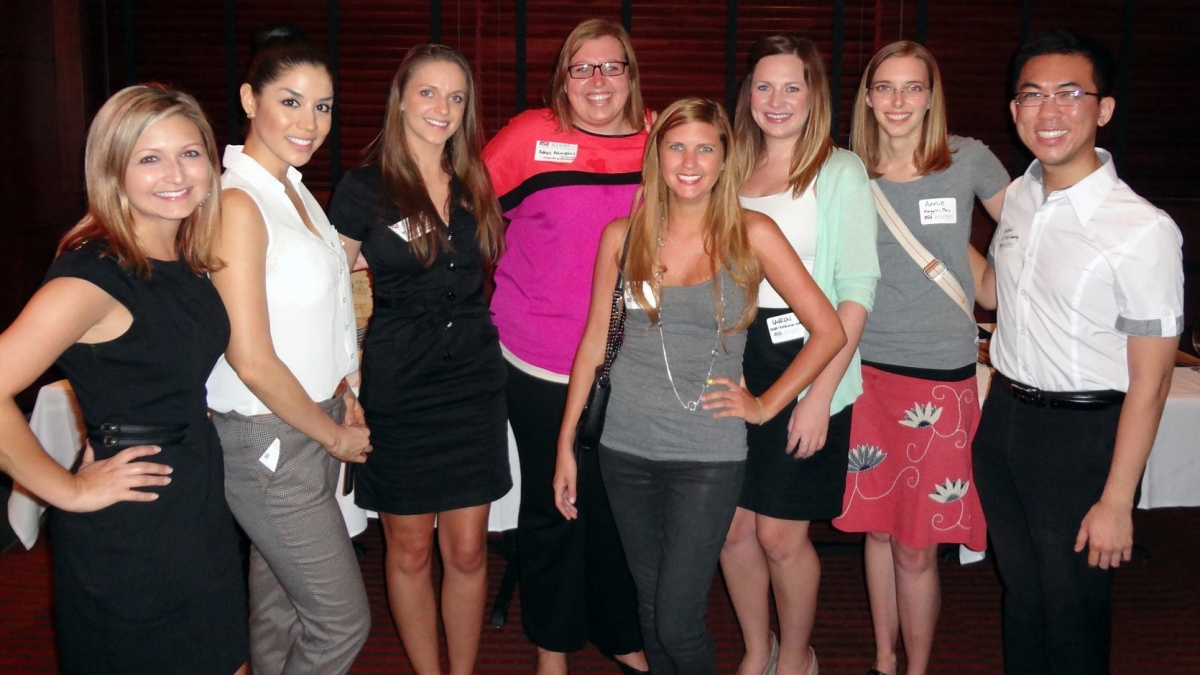Student forms ASU alumni club for nonprofit professionals

Colleen Dunbar believes in helping people make connections. A student in the master of arts in communication studies (MACS) program offered by ASU’s New College of Interdisciplinary Arts and Sciences, Dunbar used her applied project as an opportunity to create a new club within the ASU Alumni Association for graduates working in the nonprofit sector who are interested in networking and philanthropic activities.
The ASU Nonprofit Professionals Alumni Club brings together Sun Devils from all degree programs and academic disciplines who have an interest in the nonprofit sector. The organization aims to strengthen the nonprofit sector on behalf of ASU and all Sun Devils by discussing collaborative opportunities, exchanging information about new resources and programs, advising one another on issues and challenges, and working hands-on with community issues.
“It has been a really great learning experience starting this club, managing the board and being in charge of all the internal and external communications,” said Dunbar, whose goal is to pursue a career path in public relations in the nonprofit sector.
In the spring semester, she conducted background research on alumni groups, membership retention, communication campaigns and the nonprofit sector, while also completing primary research to determine the level of interest in this club with current alumni.
“I received a very positive response to both my research of potential members, as well as my proposal for the focus of the club,” Dunbar said.
She successfully completed the application process with the Alumni Association’s Board of Directors, and in May, the club was officially established. It held its first official event in September.
Activities include monthly events that vary from networking mixers to community service projects. “We volunteered as a group for the Y Race in October,” Dunbar said. “We also elected our club’s board of directors in June. I was voted to be president, and another MACS alum, Melissa Lopez, was elected vice president.”
“During her MACS program studies, Colleen has demonstrated a strong interest in organizations that represent the interests of professionals,” said Vince Waldron, a communication professor in New College’s School of Social and Behavioral Sciences on ASU’s West campus, who served as Dunbar’s faculty advisor for her project. “Her part-time position with the ASU Lodestar Center for Philanthropy & Nonprofit Innovation convinced her that nonprofit professionals needed a way to connect and have their voices heard.”
Waldron said Dunbar’s work with the Alumni Association became a classic win-win situation. “ASU benefits because many of the members of this new club are Sun Devils who graduated in recent years,” he said. “They play a vibrant role in the community and can bring energy and wisdom to ASU and our students. Colleen benefited from the Alumni Association’s experience in creating and sustaining organizations.”
Waldron noted that Dunbar’s project allowed her to apply many of the competencies she developed in the MACS program, including survey design and analysis, optimization of social media, relationship management and the creation of persuasive presentations. “A particular focus of Colleen’s project was the role of social media in growing and sustaining a group that bridges university and professional communities,” he said.
Dunbar has a track record of community service beyond her studies at ASU. She is an active volunteer for HopeKids Arizona, a nonprofit that offers weekly events and activities for children fighting life threatening illnesses and their families, as well as Sparked, an online micro-volunteering site where nonprofits describe current projects they need help with and volunteers use their skills to assist. She also donates time to organizations in her hometown of Vancouver, Canada.
The fact that she is an international student made Dunbar eligible for the Priscilla Richards Outstanding International Graduate Student award, presented by the International Students and Scholars Office for outstanding academic achievement and community/university involvement. Dunbar was recently notified that she was selected for the honor.
Dunbar said she is gratified to receive this recognition as she prepares for graduation this month and a transition from an academic career to a professional one. She said her applied project played an important role in readying her for that transition.
“Working with the Alumni Association not only provided me with real-world experience in my desired field, with a tangible outcome and portfolio of work, but it also helped me work towards my personal mission of making a difference in the nonprofit sector,” she said.
That’s exactly the point of having MACS students complete applied projects, said Lindsey Meân, faculty director for the master’s degree.
“Since the emphasis of the MACS program is communication and advocacy, the applied projects give students the opportunity to apply what they’ve learned, putting concepts and theory into practice in ways that actively engage within communities or organizations,” Meân said. “It’s a chance for them to become embedded with the groups, causes and issues that they feel drawn toward. For some, it is a way to give back to their communities or to engage with their passion.”

